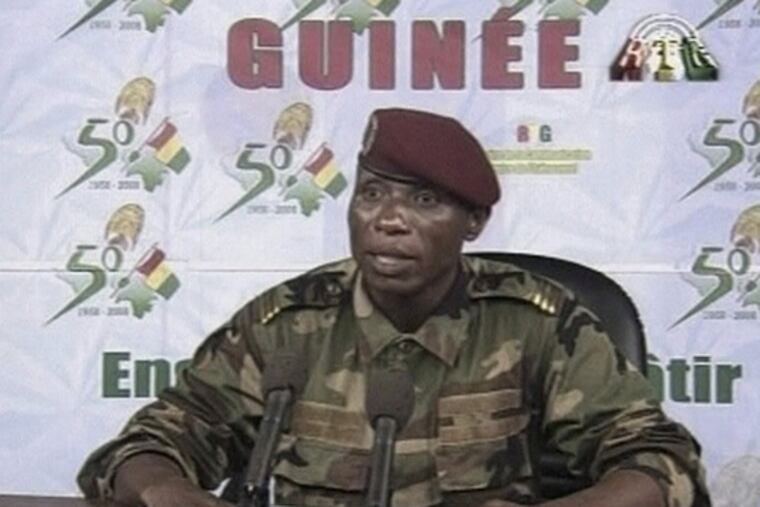Crowds cheer the leader of Guinea's military coup
Capt. Moussa Camara said his team would stay in power until elections in late 2010.

CONAKRY, Guinea - The leader of a coup paraded into Guinea's capital followed by several thousand soldiers yesterday, hours after saying his group would hold power for two years. A crowd cheered him on, screaming, "Long live the president!"
Capt. Moussa Camara stood in the first truck of a military convoy and waved to the throng that lined Conakry's streets. A phalanx of soldiers hoisting Kalashnikovs accompanied the parade.
It was the first time the capital's residents had ventured outdoors since the military-led coup was declared Tuesday in this broken West African nation, which was recently ranked Africa's most corrupt state by corruption watchdog Transparency International.
Cautiously at first, then by the thousands, people poured into the streets to watch the convoy make its way toward the presidential palace.
"I came to see if the terrain is favorable to us. I see that it is," Camara told the electrified crowd.
The renegade army captain was unknown to most Guineans until Tuesday, when he and other members of the military announced the coup after the death of longtime dictator Lansana Conte. The coup leaders initially promised elections within 60 days, but Camara broadcast another message yesterday.
"The National Council for Democracy and Development has no ambition of staying in power," he said on state radio. "We are here to promote the organization of credible and transparent presidential elections by the end of December 2010."
Camara's group set a curfew from 8 p.m. to 6:30 a.m. throughout the country, where soldiers loyal to the coup plotters circulated in tanks and jeeps armed with rocket launchers.
Prime Minister Ahmed Tidiane Souare - in hiding since the coup was declared - said earlier yesterday that the government remained in control.
"This unknown captain doesn't control the army. The majority of the troops are still loyal - but one little group can cause a lot of disorder," Souare said by phone from an undisclosed location.
It was uncertain whether Camara's group controls all of Guinea. Camara accused the government yesterday of importing mercenaries to help regain power. Parliament leader Aboubacar Sompare - constitutionally next in line to be president - said the claim showed the junta's desperation.
But those in Conakry showing support for the army takeover said the constitution would only bring more of the same.
"Sompare is a continuation of Lansana Conte," said Cozy Haba, 49. "I recognize that what we are doing instead is jumping into the unknown. But to me that's better than Sompare - who unfortunately I know too well."
Until Conte's death Monday night, Guinea had been ruled by only two people since its 1958 independence from France. Conte took power in a 1984 military coup after his predecessor's death, then won presidential elections in 1993, 1998 and 2003.
The ballots were marred by accusations of fraud. In 2003, Conte secured 95 percent of the vote - an improbably high tally for a man who many say was unpopular.
State Department spokesman Robert Wood said the United States would be "examining what options we have in the coming days," including a possible cutoff of nonhumanitarian aid. He called for the immediate "restoration of civilian, democratic rule."
But some said the coup could be the best thing for Guinea.
Africa expert Peter Pham, director of the Nelson Institute for International and Public Affairs at James Madison University in Virginia, said it would be a mistake to regard the constitution as legitimate, given that it was drawn up by supporters of Conte, a man who never intended to relinquish power.